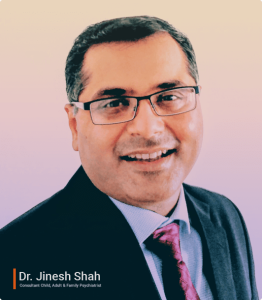“One in ten children and young people has some form of clinically diagnosable mental health disorder”
“The majority of adult mental health problems begin in childhood”
“50 percent of adult mental health problems (excluding dementia) start before the age of 15”
“And 75% of mental health problems in adult life (excluding dementia) start by the age of 18”
The above alarming findings are from robust research done in United Kingdom over the past two decades. When I read this, the first thought that comes to my mind is that “the above data is from Western World and does not apply to India; we are different from the West”. We need to ask ourselves that in the current times, are we really that different from the West?
If the above is true that mental health issues in young people is a West phenomenon; then let’s look at the following-
“India Has the Highest Suicide Rate Among Youth.”
As per The Minds Foundation, unfortunately, India has the highest suicide rate in the world among the youth standing at 35.5 per 100,000 people for 2012, the last year for which numbers are available.
“It is estimated that the incidence of nonfatal deliberate self-harm (DSH) is 250 per 100,000 persons per year.”
This is as per Paramjit et al (Indian Journal of Psychiatry).
The urbanisation, the globalisation, the emergence of working families, the exposure to social media, the pace of life, the interests/hobbies/pursuits we have nowadays, the education system, the cut-throat competition, the social/personal/ethical/cultural values which we are fast adapting- are we really that different from the West?
In fact, the reality is that we are wanting to walk in the same shoes as West in most aspects of our life (education, corporate, professional, personal lifestyle); but the infrastructure, moral/ethical/social values, timekeeping, civic sense around us does not keep pace with that. Hence, due to this mismatch, gap and conflict, we are probably even more exposed to frustrations, apathy, hopelessness, withdrawal than the West. Plus stigma, reservations and lack of specialist services adds to these, resulting in more difficulties in accepting, recognising and accessing specialist mental health and wellbeing services geared specifically for children, adolescents, young adults and families.
Things are gradually changing. Courageous and bold young people like Zaira Wasim (“Dangal” and “Secret Superstar”) are raising awareness about mental health issues in this age group. Recently, Zaira spoke about how she suffered with Depression and Anxiety from age 13. Three cheers to Zaira for openly talking about this; this helps combating the stigma. The idea is not that everyone should talk openly about this; the idea being that people get the courage to access the right help and talk confidentially.
World Health Organisation has recently said that rates of depression in India in children vary between 0.3 to 1.2%. If the above figures are for depression alone, what about other mental health disorders like Anxiety Disorder, Panic, Phobias, Psychosis, Mania, Obsessive Compulsive Disorders, Somatisation Disorders, ADHD, etc.
We also need to bear in mind that for every young person who has a diagnosable mental health disorder, there are many more that do not have a diagnosable condition. They may only have behavioural symptoms. Low self-esteem, selective mutism, some degree of anxiety, nervousness, fear, anger and aggression, withdrawal, social skills deficits, self-destructive behaviours, avoidance behaviours, passive and active resistance behaviours; to just name a few. We need to understand each behaviour in an individual and functional manner. All these behaviours have the potential of causing long term mental health and wellbeing issues; they can affect our personalities, our relationships and our whole life.
We also need to keep in mind psychosomatic illnesses where both physical/somatic features and mental health features go hand in hand and exacerbate each other. Some common examples would be Asthma, Irritable Bowel Disease, Crohn’s Disease, Epilepsy, Psoriasis, etc. Then there are Somatisation Disorders and Conversion Disorders where people tend to come with a physical or neurological symptom which does not have an organic cause, but has an emotional or mental health cause. Common examples would be that a person experiences pain or weakness in a part of the body, or experiences specific symptoms like a fit, or nausea, etc. Also, Medically Unexplained Symptoms is another term used in a similar context. In all the above cases, to summarise, there is an underlying emotional or mental health reason, which is either clearly visible co-existing with physical symptoms or is submerged and is hard to come to the surface.
There is not just a strong health case to justify mental health and wellbeing of children, adolescents, young adults and families; but there is a moral and ethical case (we owe this to our future generation); there is a social case (we owe this for a healthier and open society); and above all, there is a very strong economic case for this. Our mental health and wellbeing has a huge impact on our potential, our scholastic performance, our goals, our future career, and our achievements.
Let’ ask ourselves, again-
Are we sitting on a minefield?
Are we seeing just the tip of an iceberg?
“MIND THE GAP”
With the above gap in mind, we are developing the Child, Adolescent and Family Mental Health & Well-Being Clinic. Our motto is “NO HEALTH WITHOUT MENTAL HEALTH”. We aim to provide a CONFIDENTIAL service, which will LISTEN TO YOU, and which will be SPECIFIC TO YOUR NEEDS AND PREFERENCES. We will provide full range of assessment and treatment for mental health and behavioural disorders affecting children, adolescents, young people and families.

Dr. Jinesh Shah
Consultant Child, Adolescent & Family Psychiatrist
MBBS,
MRCPsych (UK),
Dip Clinical Psychiatry (UK),
CCT in Child and Adolescent Psychiatry (UK),
CCT in General Adult Psychiatry (UK),
Cert. Hypnotherapy (UK).
Phone: +91-70434 04574
Email: drjinesh@gmail.com

